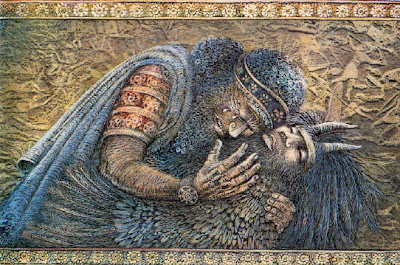Putting the 'Epic' in Epic of Gilgamesh
Tolkien is usually credited with kicking off the fantasy genre, but if Ancient Summaria had had a higher literacy rate than 0.000001% back in the 18th Century (we're talkin' BC here), it might have been the Epic of Gilgamesh.
This epic has all the qualities we now consider epic fantasy. Behold and marvel:
1. The mighty hero.
You can't deny Gilgamesh is a badass. He's not a perfect man, which makes him a perfect hero. Like many a fantasy hero, he's a king but one who, inexplicably, leaves the boring work of debating about health care tax reforms to his minions and spends his time traveling the world in search of adventure and immortality.He's also an antihero. What--you thought that was a recent development? When we first meet Gilgamesh, he's a brutal tyrant and a womanizer, sleeping with all the new brides on their wedding nights. Shame on you, Gil.
2. The mighty sidekick.
A hero is only as good as his sidekick. Gilgamesh has this in Enkidu. The epic of Gilgamesh is the original Buddy Movie (tablet, whatever), the first Bromance.Yeah, okay, Enkidu does get knocked out fairly early on--if the nameless Summarian priest who scratched this epic onto clay tablets in a language based on chicken ballet positions had had an editor, maybe someone could have pushed back on this plot line. You see the problem with self-publishing?
But first, Enkidu fights Gilgamesh in defense of the fair virgins of the realm. Gilgamesh whoops him, but learns a valuable life lesson along the way. Actually, the original epic is a little unclear on that point. But what Enkidu does do is lure Gilgamesh away from womanizing and terrorizing his own subjects to go on a quest to bash the skull of some ogre.
Just imagine how much easier everything in Syria would be if instead of all the fighting, some dude in a fur tunic could have simply said to Assad, "Hey, want to ditch this joint and go kill monsters with me?"
And Assad would have been, "Dude, yeah. I just realized what an ass I've been this whole time. Let me use my powers for good and not evil from this day forward."
Fiction is so much better than real life.
3. A Girl in A Chainmail Bikini.
Every epic fantasy needs a princess. Or a temple prostitute. Whatever. Some chick in a chainmail bikini.Enter Shambat the She-Warrior. (Ok, I made up that title.) She's the one who teaches Enkidu table manners and also Makes Him A Man in other ways, if you know what I mean.
4. A quest.
Epic fantasy needs a quest of epic proportions--in this case to find the secret of immortality. Now, modern readers might prefer Gilgamesh was less intent on his own prolonged existence and more interested in saving the world from a nasty scheme of Ereshkigal to conquer the Earth with zombies, but you can't expect the Summarians to think of EVERYTHING.5. Travels to distant lands.
Gilgamesh and Enkidu travel about, as good heroes should. I'm not sure the author remembered to include a map however.6. Proper Scope and Backstory
What really makes the epic of Gilgamesh work as a proper epic is the scope. Remember the Hero vs. Everyman spectrum? If Gilgamesh were just an ordinary guy, or even just an ordinary king, he'd be too dull to waste clay on.On the other hand, unlike creation stories, which are all about the gods, Gilgamesh is human enough we can relate to him. Who among us wouldn't be tempted to have all the hotties brought to our beds if we were tyrants of an ancient Mesopotamian kingdom? (Be honest.) He's failable, he can learn and change and grow.
The scope of the story is right too. The deeds of Gilgamesh are important. They change the destiny of the world. But there's already a huge backstory before his quest even begins. There are other heros who have gone before him, like Utnapishtim, the man who survived the Flood, and the only other mortal to have earned immortality.
7. A Menagerie of Monsters and Pantheon of Gods
Every epic fantasy needs a plethora of dangerous, magical monsters to fight and gods, both good and evil, to screw things up.Check.
8. Characters Die Then Magically Come Back To Life If The Plot Calls For It
The author apparently realized that the story was boring without Enkidu, and brought him back in Tablet Twelve without explanation. Just kidding. There was a perfectly reasonable explanation.Magic!
9. Multi-volumes.
Would the Wheel of Time be epic if it were the length of Old Man and the Sea?
C'mon.
Epic of Gilgimesh has twelve, count 'em, TWELVE, tablets. How's that for sequel heaven?
It wouldn't be an epic fantasy if there weren't multiple volumes, probably published with long intervals in between during which the restless fans stormed the Sacred Temples, demanding the sequels. Also, just think how long the fans had to wait between the hardcover and the ebook. About 3,000 years.
10. A Twist Ending
Gilgamesh goes on this big quest for immortality, and at the end of it all...Well, I wouldn't want to post any spoilers.



Comments
Jai